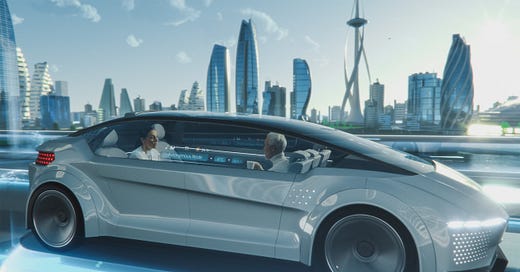🚗 Aargh! Self-driving cars seem stuck in the slow lane.
Also: 5 Quick Questions for ... economist Michael Strain on recovering from pandemic-era learning loss
Item: We are over an hour into dinner and [Elon] Musk is in a hurry, having scheduled a call with his SpaceX team. We skip dessert and I ask for the bill, only to find out it’s already been settled by Musk’s security chief. … We head back to the car that is taking him to a private airport to board his jet and he suggests we continue our conversation on the way. I find [his son] X exactly where I left him, in his car seat, but he’s more cheerful after his nap. He is cooing as he watches videos of rockets on his iPad while his dad discusses rockets with his team. Suddenly, I notice that the car is driving itself, as if to dispel the doubts I had expressed about Tesla’s self-driving prospects. “It can get to the airport without intervention,” says Musk. Alarmed, I put my seatbelt on. Musk could be a magician, but he could also be wrong. Elon Musk “Lunch with the FT” interview with Financial Times editor Roula Khalaf, 10/07/2022
In the Before Times, I was a person more concerned about the potential regulatory obstacles to self-driving vehicles than the technological ones. Three reasons: First, there’s my profession as a policy journalist and analyst. As someone who works at a think tank, I naturally tend to view challenges, at least initially, through the lens of public policy. Second, I’ve written extensively about the role of bad regulation in slowing or preventing technological progress and innovating in the physical world. Third, and perhaps most importantly, entrepreneurs and technologists just seemed so darn confident about autonomous vehicles — and that’s even with me discounting the hype somewhat. (I was a reporter during the 1990s tech boom, after all.)
But as technology journalist and Substacker Timothy Lee noted in a recent Faster, Please! 5 Quick Questions chat, regulation really hasn’t been that big a deal: “The federal government has taken an extremely hands-off posture. … Some states have had more regulations, like California is stricter than most other states. But even there, it's mostly about reporting and paperwork. Nobody's really trying to keep this stuff off the roads.”
“It's just a really hard technical problem”
Today, the hype over a self-driving future has dissipated significantly because of the technology challenge. “It's just a really hard technical problem,” Lee added. So hard, apparently, that even though the above paragraph from Elon Musk’s chat with the FT may not seem overwhelmingly positive about self-driving cars, I’ll accept just about anything that’s not downright pessimistic about the present and future of AVs. For instance: Back in May, Musk’s repeated claim in recent years that Tesla will have a million robotaxis on the road by the end of the year turned into “one million people in FSD Beta,” which lets a Telsa drive autonomous to a designated destination, but the driver needs to be ready to take the wheel at all times. So no napping or flipping through TikTok.
Musk’s failure to yet deliver a vehicle with full self-driving capabilities is just one of many examples cited in a new Bloomberg Businessweek long-read about the state of driverless vehicles, “Even After $100 Billion, Self-Driving Cars Are Going Nowhere.” Written by columnist Max Chafkin, the piece has two main components. First, it compares the state of the technology today versus where many proponents predicted it would be five to ten years ago. Peak AV Optimism might have been in 2017 when engineer and self-driving pioneer Anthony Levandowski moved from Uber to Google — and Google sued for nearly $2 billion in damages saying that Levandowski took a work laptop home, downloaded its proprietary AV tech contents, and gave the whole kit-and-kaboodle to Uber. As Chafkin writes:
The lawsuit was destabilizing but also validating in a way. Google’s $1.8 billion claim for damages suggested it had done the math based on just how imminent the fortunes to be made from driverless technology were. “People were playing for this trillion-dollar prize of automating all transportation,” Levandowski says. “And if you think it’s really just a year away, you take the gloves off.” … The multibillion-dollar lawsuit and federal criminal case got Levandowski fired, forced him into bankruptcy, and ended with his conviction for stealing trade secrets. He only avoided prison thanks to a presidential pardon from Donald Trump.
Lots of investment but disappointingly little progress
And where is the technology today? Nowhere close to achieving a trillion bucks in market value as it virtually eliminates road fatalities, parking lots, and roadways that commuter traffic turns into parking lots.
Keep reading with a 7-day free trial
Subscribe to Faster, Please! to keep reading this post and get 7 days of free access to the full post archives.




